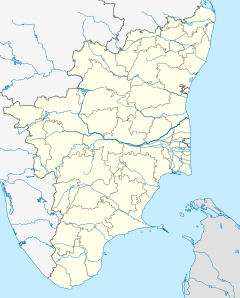Swaminathaswamy Temple, Swamimalai
| Swamimalai temple | |
|---|---|

Swamimalai Temple
|
|
| Name | |
| Other names | Swamimalai Murugan Temple |
| Proper name | Arulmigu Sri Swaminathaswamy Temple |
| Geography | |
| Coordinates | 10°57′25″N 79°19′33″E / 10.956844°N 79.325776°ECoordinates: 10°57′25″N 79°19′33″E / 10.956844°N 79.325776°E |
| Country |
|
| State | Tamil Nadu |
| District | Thanjavur |
| Locale | Swamimalai |
| Culture | |
| Primary deity | Skanda-Murukan also known as Swaminatha |
| Architecture | |
| Architectural styles | Dravidian |
Swamimalai Swaminathaswamy Temple is a Hindu temple located in Swamimalai dedicated Murugan 5 km from Kumbakonam on the banks of a tributary of river Cauvery, 250 km from Chennai, the capital of Tamil Nadu, India. The temple is one of the six holy shrines of Murugan called Arupadaiveedu. The shrine of the presiding deity, Swaminathaswamy is located atop a 60 ft (18 m) hillock and the shrine of his mother Meenakshi (Parvathi) and father Shiva (Sundareswarar) is located downhill. The temple has three gopuram (gateway towers), three precincts and sixty steps and each one is named after the sixty Tamil years. The temple has six daily rituals at various times from 5:30 a.m. to 9 p.m., and three yearly festivals on its calendar. The annual Vaikasi Visagam festival is attended by thousands of devotees from far and near.
As per Hindu legend, Muruga, the son of Shiva, extolled the meaning of the Pranava Mantra (Hindi: ॐ AUM) to his father at this place and hence attained the name Swaminathaswamy. The temple is believed to be in existence from the Sangam period from 2nd century BC and was believed to have been modified by Parantaka Chola I. The temple was greatly damaged during the Anglo-French war between Hyder Ali and British in 1740. The temple, in modern times, is maintained and administered by the Hindu Religious and Endowment Board of the Government of Tamil Nadu.
As per Hindu legend, Brahma, the Hindu god of creation, disrespected Muruga (the son of Shiva) at the time of visiting Mount Kailash, the abode of Shiva. The child Muruga got angry with Brahma and asked him how he was creating living beings. Brahma said that he was creating living beings with the help of the Vedas (Hindu scriptures). On hearing the reply, Muruga asked Brahma to recite the texts from Vedas. Brahma started to recite the text with the holy word called Pranav Mantra, "Om". At that time Muruga stopped Brahma and asked him to explain the meaning of the Pranava Mantra. Brahma did not expect such a question from the child and could not reply. Muruga knocked Brahma on his forehead with his clenched fists and punished him with imprisonment. Muruga took up the role of the creator. The Devas (celestial deities) were surprised by the absence of Brahma and they requested Vishnu to negotiate with Muruga to release Brahma. Vishnu could not help and as the last resort, Shiva went to the rescue of Brahma.
...
Wikipedia

